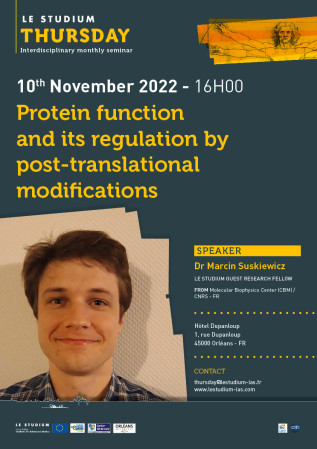Protein function and its regulation by post-translational modifications
Hôtel Dupanloup
1 rue Dupanloup
45000 Orléans
France
Presentation
While DNA is a more famous molecule, its role is to serve as a set of recipes for the production of proteins. It is proteins that are the main ‘molecular machines’ of the cell, where they perform chemical and mechanical work that sustains life. The function of proteins depends on their three-dimensional structure, which is studied by scientists using a variety of physical and computational methods. However, proteins are not static molecules. To efficiently perform their tasks, they have to be dynamically regulated: switched on and off, recruited to specific cellular locations and partners, and degraded in a timely manner. One of the main mechanisms that regulate these processes in cells is temporary covalent attachment, to a protein, of extra regulatory elements known as protein post-translational modifications. These attachments change the structure and therefore the function of proteins.
In this talk, aimed at a general audience, I will introduce key concepts in protein structure and function and new advances in the field of protein science. From there, I will go on to discussing protein post-translational modifications as a regulatory mechanism that targets proteins to specific locations in the cell, adjusts their activity and interaction partners, and can trigger protein degradation. I will finish by presenting my own work and future plans concerning four protein post-translational modifications (phosphorylation, ADP-ribosylation, ubiquitylation, and SUMOylation).
Speaker
LE STUDIUM Guest Research Fellow






